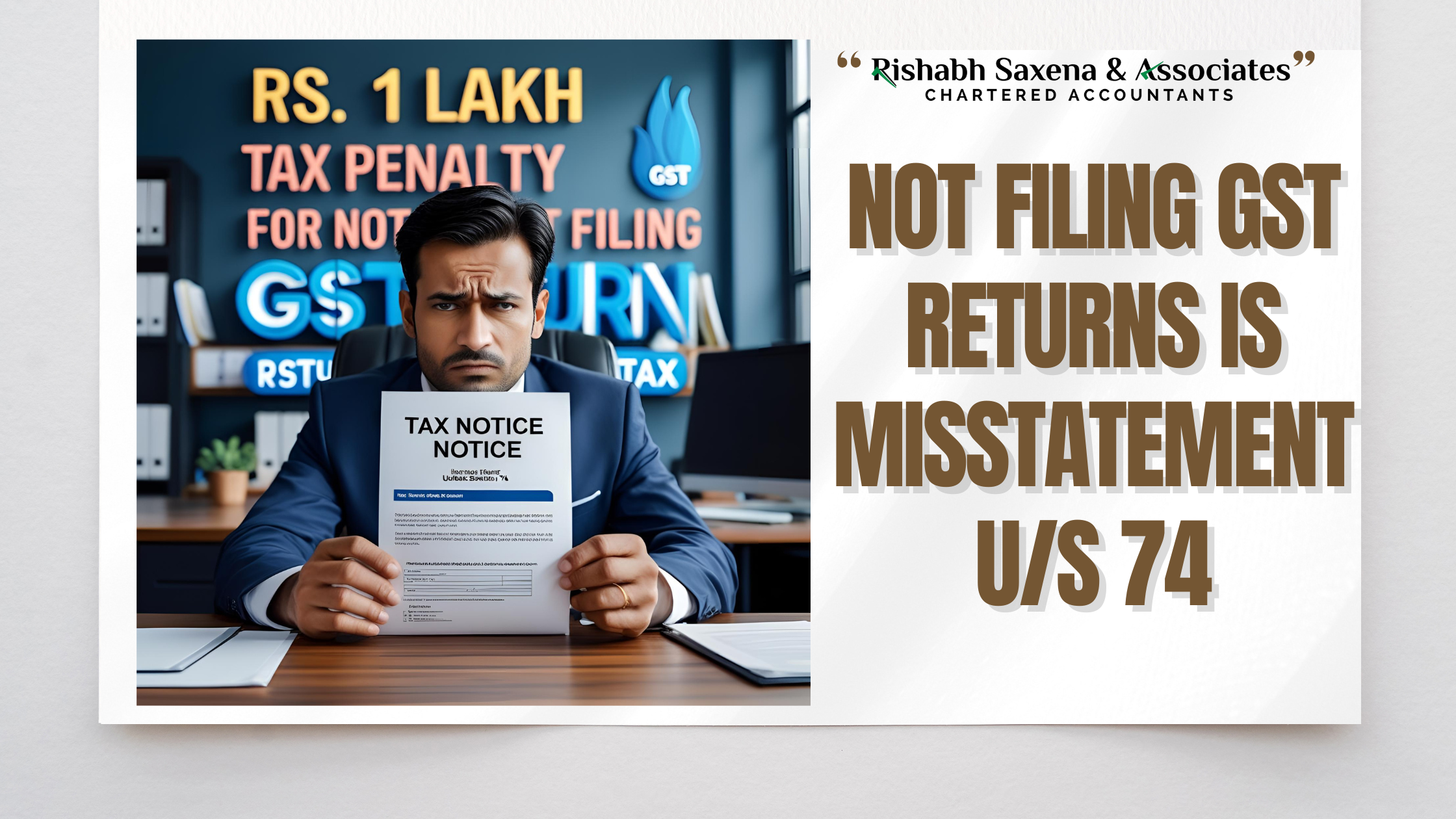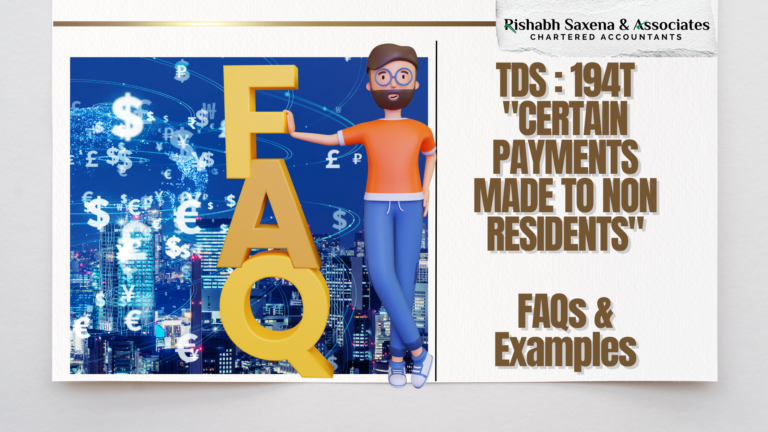GST Penalty Shock: Non-Filing Monthly Returns Can Cost You 100% Tax – New High Court Ruling 2025
Updated: June 2025 | Reading Time: 8 minutes
Are you facing GST penalty notices under Section 74? A recent High Court judgment has completely transformed how tax authorities can impose the dreaded 100% penalty on GST non-compliance. This landmark ruling affects thousands of businesses struggling with GST return filing and payment delays.

What is the GST Section 74 Penalty? Understanding the Basics
Section 74 of the CGST Act allows tax authorities to impose penalties equal to 100% of the unpaid tax – but only under specific circumstances. Unlike the milder Section 73 penalty (10% of tax), Section 74 is reserved for serious violations involving:
- Fraud
- Willful misstatement
- Suppression of facts to evade tax
Key Difference: Section 73 vs Section 74 GST Penalty
| Section 73 Penalty | Section 74 Penalty |
|---|---|
| 10% of tax or ₹10,000 (whichever higher) | 100% of unpaid tax |
| Innocent non-compliance | Fraud/willful suppression |
| No intent to evade | Intent to evade tax |
The Game-Changing High Court Judgment: Key Facts
Case Background
A partnership firm working as a sub-contractor failed to file monthly GST returns (GSTR-3B) despite receiving partial payments from their client. The firm argued they couldn’t pay GST due to insufficient payments, but paid all taxes worth ₹3.19 crores before the show cause notice was issued.
What the Court Decided
The High Court ruled that receiving partial payments while not filing monthly returns constitutes “willful suppression of facts” – even if you pay the full tax later. This creates a new precedent for GST penalty cases.
Critical Ruling: When Does Non-Filing Become “Willful Suppression”?
The Court’s 4-Point Test
The judgment establishes that willful suppression under Section 74 occurs when:
- Taxpayer receives some payments from clients
- Monthly GST returns (GSTR-3B) not filed on time
- No proportionate tax paid despite having some funds
- Intent to evade tax can be inferred from circumstances
Real-World Impact
This means that even cash flow problems don’t excuse non-filing if you’ve received any payments. The court rejected the argument that annual return deadlines excuse monthly non-compliance.
Section 74(5) Protection: How to Avoid 100% Penalty
The Safe Harbor Provision
Section 74(5) of CGST Act allows taxpayers to avoid penalties by paying:
- Full tax amount
- Interest under Section 50
- 15% penalty
All three must be paid BEFORE the show cause notice to claim protection.
Why the Petitioner Lost Protection
The firm paid tax before the notice but paid interest AFTER the notice was issued. The court held this breaks the protection, making them liable for full penalties.
Monthly vs Annual GST Return Filing: Court Clarifies Confusion
The Taxpayer’s Failed Argument
The petitioner argued they had time until February 7, 2022 to file annual returns under Section 44, so monthly non-filing shouldn’t matter.
Court’s Response
The High Court firmly rejected this, stating:
- Sections 37-39 mandate monthly return filing by 20th of next month
- Monthly compliance cannot be substituted by annual filing
- Non-filing of GSTR-3B constitutes suppression of required information
Landmark Precedents: How This Case Differs
Distinguished Cases
1. CCE vs. Adecco Flexione (Favorable to Taxpayers)
- Previous ruling: No penalty if tax paid before show cause notice
- This case: GST Act language different; doesn’t provide same protection
2. Uniworth Textiles vs. CCE (Supreme Court)
- Previous ruling: “Mere non-payment” doesn’t equal willful suppression
- This case: Here there was willful suppression beyond mere non-payment
CBIC Instruction 05/2023: Supporting the Ruling
The Central Board of Indirect Taxes instruction clearly states Section 74(1) requires “material evidence of fraud or willful misstatement” – supporting the court’s approach.
Practical Implications for GST Taxpayers
Immediate Action Items
- File monthly GSTR-3B returns even with partial payments
- Pay proportionate tax based on received amounts
- Don’t rely on annual return deadlines for monthly obligations
- Complete Section 74(5) payments (tax + interest + 15% penalty) before any notice
For Businesses Facing Cash Flow Issues
- Partial compliance is better than no compliance
- Document all efforts to arrange payments
- Communicate proactively with tax authorities
- Seek professional help for penalty reduction strategies
Red Flags: When Section 74 Penalty is Likely
High-Risk Scenarios
- ✗ Receiving client payments but not filing returns
- ✗ Multiple months of non-filing with business activity
- ✗ Large tax liabilities with extended delays
- ✗ Previous notices ignored or inadequate responses
Lower Risk Situations
- ✓ Genuine business closure or minimal activity
- ✓ Immediate compliance after discovering errors
- ✓ Complete Section 74(5) payments before notice
- ✓ Clear documentation of financial hardship
Expert Tips: Defending Against Section 74 Penalties
Legal Strategy Points
- Challenge mens rea (intent) – prove no intention to evade
- Demonstrate good faith through voluntary payments
- Show proportionality between payments received and tax paid
- Question evidence quality in show cause notices
Documentation Essentials
- Bank statements showing payment constraints
- Client communication regarding delayed payments
- Voluntary payment records before notices
- Professional advice sought timeline
Future of GST Penalty Enforcement
Trends Post-Judgment
- Stricter enforcement of monthly filing requirements
- Higher burden of proof for taxpayers claiming innocent non-compliance
- Focus on proportionate compliance based on cash flows received
- Reduced tolerance for extended non-filing periods
Legislative Implications
This judgment may prompt:
- Clearer guidelines on willful suppression criteria
- Safe harbor provisions for cash flow constraints
- Revised penalty structures for different violation types
Frequently Asked Questions (FAQs)
Q1: Can I avoid Section 74 penalty if I pay tax before the show cause notice?
A: Not automatically. You must pay tax + interest + 15% penalty ALL before the notice under Section 74(5).
Q2: Does cash flow problem excuse non-filing of monthly returns?
A: No. The court ruled that receiving any payments while not filing returns can constitute willful suppression.
Q3: Is annual return filing sufficient if monthly returns are missed?
A: Absolutely not. Monthly and annual filing requirements are separate and independent.
Q4: When does non-payment become “willful suppression”?
A: When you receive payments but don’t file returns or pay proportionate tax, showing intent to suppress facts.
Q5: Can I challenge the Section 74 penalty in court?
A: Yes, but you must prove the absence of fraud, willful misstatement, or suppression of facts with strong evidence.
Conclusion: Key Takeaways for GST Compliance
This landmark High Court judgment fundamentally changes GST penalty landscape. The ruling establishes that:
- Monthly GST return filing is non-negotiable – cannot be excused by annual return timelines
- Receiving partial payments creates compliance obligations – proportionate tax must be paid
- Section 74(5) protection requires complete payment – tax, interest, AND penalty before notice
- Intent to evade can be inferred from circumstances, not just explicit fraud
Final Advice
Don’t wait for cash flow to improve – file returns and pay proportionate tax immediately. The cost of non-compliance has just become much higher with this precedent.
Need expert help with GST penalty matters? This judgment affects thousands of pending cases and future assessments. Professional guidance is now more critical than ever.
Disclaimer: This analysis is for informational purposes only and should not be considered as legal advice. Consult qualified tax professionals for specific cases.
Refer to the judgement: Indiakanoon
Refer section 74: Section_74






